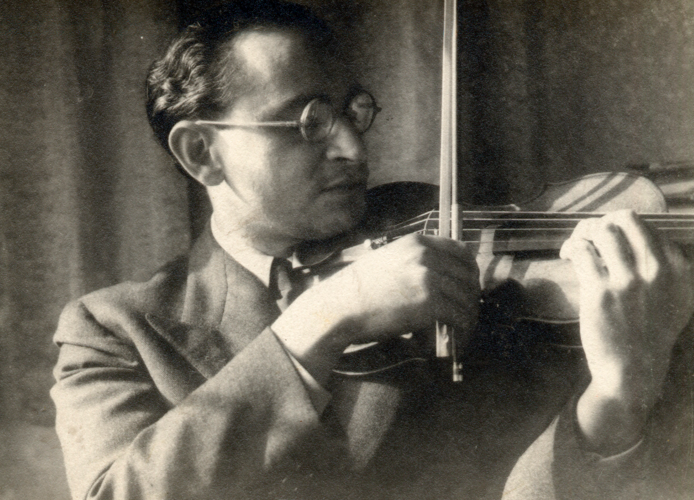Max Rostal
Max Rostal
Violinist Max Rostal (1905–1991) faced immediate dismissal from his position as a professor at the Berlin University of the Arts (today’s UdK) after the Nazis rose to power in 1933. While he never returned during his lifetime, his legacy made its way back to Berlin. Since 1997, the violin and viola competition he established has been held at the University of the Arts (known as Hochschule der Künste until 2001). This year, to mark the International Max Rostal Competition, the university history column of the Music Newsletter pays homage to this extraordinary musician.
Let’s take a step back to the “good old days” of the Austro-Hungarian monarchy. Around 1910, a French violin teacher, described in the local directory as an “academic painter and violin virtuoso,” arrived in the town of Teschen (today Cieszyn in Poland and Těšín in the Czech Republic), then part of Austrian Silesia. He published an ad, offering free violin lessons to a particularly talented child. A father came forward with his nine-year-old son, but the teacher, though impressed by his abilities, thought the younger five-year-old brother would be even more suitable. And so, it was Max Rostal, rather than his brother Leo, who embarked on a journey with the violin. Grete Fischer, later an editor at the Ullstein publishing house, captured this pivotal moment in Max’s life with these words: “The professor placed a tiny violin in his hand and said, ‘Play!’ and Max played; he never stopped.”
Though this tale may sound like a fairy tale, Max’s path was not always so charmed. He was groomed into a “child prodigy” with no small amount of pressure, performing across the Austro-Hungarian monarchy just before World War I. The hardships of early fame took a toll on his childhood, yet they laid the foundation for a remarkable career as a violinist and teacher. The true turning point came when he met Carl Flesch. Just after his family’s move to Berlin, music critic Adolf Weißmann introduced Rostal to Flesch, having been struck by Max’s performance at a house concert. In 1920, he joined Flesch’s summer academy in Baden-Baden and later attended special courses at the Berlin University of the Arts in 1921/22. Recognizing his potential, Flesch waived Rostal’s tuition fees, enabling him to study without financial burden.
In the culturally vibrant 1920s, the contrasting lives of the Rostal brothers reflect the spirit of the era. Max was immersed in Berlin’s rich classical music scene, supported by his teacher and the concert agency Wolff & Sachs. By 1929, he had formed the Max Rostal Quartet. Meanwhile, Leo, now a cellist, found a place in Berlin’s bustling entertainment industry, performing at venues such as the Hotel Adlon, which afforded him ample opportunities for leisure. Through the Jewish Cultural League, he later turned to more serious musical pursuits.
After studying in Berlin, Max briefly returned to Vienna, hoping to gain support from his former teacher Arnold Rosé. When this proved fruitless, he moved to Oslo for a season as concertmaster before Carl Flesch offered him an assistant position in Berlin. Flesch had recently secured a professorship in 1928, a role Rostal hoped to obtain for himself. However, with the looming rise of the Nazis, his ambitions were cut short. Social Democratic Culture Minister Adolf Grimme hesitated to appoint Rostal due to his Jewish background, but ultimately granted the position after Deputy Director Georg Schünemann championed his cause.
Rostal held his professorship for only a brief period before the Nazis dismissed him. In 1934, he emigrated to London, where he started anew. Within a year, he performed on the BBC and later joined the faculty of the Guildhall School of Music and Drama. Following World War II, his illustrious career took him on concert tours worldwide.
Although he became a “celebrated British violinist,” Rostal returned to the German-speaking world in the late 1950s, partly for health reasons. He accepted a prestigious professorship at the Cologne University of Music in 1957 and began teaching in Bern the following year, eventually settling in Switzerland. He founded renowned masterclasses, modeled after Flesch’s Baden-Baden programs, in Strobl by Lake Wolfgang, later moving them to Adelboden and Bern. As a founding member of the European String Teachers Association (ESTA), he continued to inspire generations of musicians. He played a Stradivarius that now bears his name, and his impressive list of students includes celebrated violinists such as Edith Peinemann and Igor Ozim. One of Leo’s students, Anita Lasker-Wallfisch, survived Auschwitz, where she played in the women’s orchestra.
Rostal’s connection to Berlin endured even after his passing. In 1998, his personal archive was transferred to the UdK, returning a piece of his legacy to the city. This rich collection includes a remarkable assortment of autograph manuscripts from composers like Paganini, Debussy, and Bartók. Archivist Antje Kalcher meticulously compiled a finding aid that reveals his extensive network through his correspondence. Together, we published his autobiography, Violin-Schlüssel-Erlebnisse, in 2007, which also contains notes from his brother Leo. Today, the archive’s reading room houses Rostal’s grand desk, designed by Heinrich Tessenow—a fitting tribute to a life so deeply intertwined with music and history.
Author: Dr. Dietmar Schenk, former Head of the University Archive
